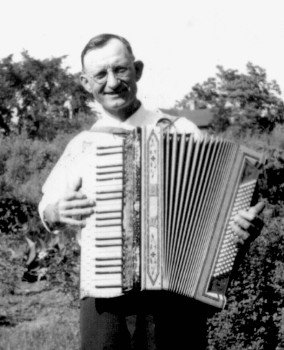
Grandpa with his accordion, Joliet, Illinois, 1946
 Grandpa with his accordion, Joliet, Illinois, 1946 |
Our family has had its share of musicians in the past. All my father's siblings took some sort of instrumental music lessons such as violin or accordion, although he, being the youngest, somehow missed out on that tradition. His father played accordion and performed with various groups around the Joliet and Chicago area. I remember being entranced by the beautiful accordion he owned, with its 3 keyboards and red pearl decoration. My mother remembers seeing a wonderful framed photo of her uncles hanging on the wall. They were lined up according to size and each held a corresponding sized horn, from tuba to trumpet. Mom's most notable musical experiences were of singing in the chorus for operetta productions at the Joliet Junior College when she was a student.
My early childhood memories are often chronologically mixed up and fragmented, but I can recall plenty of small specifics. The earliest influences of music came from popular songs. Around age 3 or so, I had a yellow polka-dot bikini, which my mother knit for me. Of course, I also knew the song but didn't relate much to the modesty of the singer as our ages obviously differed significantly. One of my favorite early toys was a one-eyed, one-horned flying purple people eater, crocheted by my mom. It was a beautiful deep shade of purple and, for most of my youth, that was my favorite color. However, my most beloved toy was Puff, the magic dragon, also made by Mom. I took that little dragon everywhere for years. I was sure that he would not suffer the fate of the one in the song, being left alone and forgotten. He had a number of adventures, including being thrown into a garbage can at a boat show (but retrieved by a nice teenager), going camping and being packed into my duffel bag, and going to Camp Pinewood (YMCA) where he always became the cabin mascot. He even has a small red mark on one of his white teeth where we vaccinated him for "cooties."
I was lucky to grow up in Illinois, which has one of the prettiest state songs in the U.S. I never learned the words (there are four verses), but the opening line "By thy rivers gently flowing, Illinois, Illinois," and the simple, folk-like melody appealed to me even at an early age. Another favorite song ties in with my all-time favorite flower. "White Coral Bells" is a short, simple round about lily-of-the-valley, a flower with the best fragrance I know. To this day I cannot prune our lavender plants without the ditty, "Lavenders Blue," running through my head.
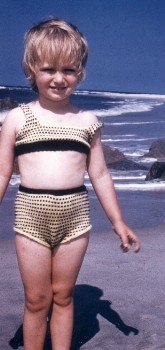 My yellow polka-dot bikini, Florida, 1961 |
Although there are numerous songs about paddling and canoeing, we never sang them while actually doing those activities. I think the songs are more for remembering the fun times on the water than for accompanying the physical act of paddling or rowing.
There were always songs and music around our house. I had the usual little 45 RPM records with kids' songs on them, heard music on the television ("Sing Along With Mitch Miller" and "Lawrence Welk," not to mention all the musicals and film scores) and radio, learned songs from my parents, and sang to myself. Dad would sing songs like "You are My Sunshine," "King of the Road," "Lemon Tree," and "Big John." My mom taught us all the usual kids' songs, using sing-along type books and sometimes playing the melodies on guitar. I used to occupy myself for hours in our basement, riding on my rocking horse, singing songs to myself in time to the motion, songs about fishies swimming over the dam, cement mixers, itsy bitsy spiders, and mares and does eating oats. A couple early television programs with especially appealing music were "The Wizard of Oz" and the Christmas special, "Rudolph, the Red-Nosed Reindeer." Vicky and I would laugh as we listened to a 45 RPM record of "Dem Bones," or dance and spin wildly to the tune "Pink Elephants" from Disney's "Dumbo." Of course, just like millions of other kids, we learned our alphabet to the tune of "Ah, vous dirais-je, maman" (also the tune to "Twinkle, Twinkle Little Star") by Mozart.
Even at an early age, I found musical instruments fascinating. Whenever I was near a piano, I couldn't help but mess around picking out tunes on the keys. We also had toy wind instruments like recorders, and at one time had an accordion, which was a bit too big for me. One instrument that I actually learned to play was the ukulele. This miniature string instrument was a lot of fun, even to the point of tuning it (my dog has fleas). I was able to perform such hits as "My Bonny Lies Over the Ocean" and "Bingo." When I was about three or four, my grandmother took me to the cinema to watch some popular children's film. It was a common event in those days to have a drawing from the ticket stubs for each show, and I ended up winning a full-sized acoustical guitar! I remember it being about as tall as I was, and I had to walk up to that huge stage at the front of the theater to claim my prize. I gave the instrument to my older cousin, Don, who learned to play it and for years had his own band.
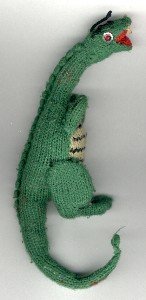 Puff (the magic dragon) |
Some of my favorite humor on television was associated with musical instruments. Jack Benny was funnier because he had a violin. I loved to watch the Marx brothers, partly because of Chico playing the piano and Harpo playing the harp (as well as the clarinet in one instance). The only routine which impressed me from Ernie Kovacs' show was that of the Nairobi Trio playing "Solfeggio." I was both fascinated and repulsed by the mechanical movement, horrible masks, and impeccable comedic timing of the apes, and used to hum the tune over and over to myself, always imagining a staccato, xylophone sound.
Our introduction to concert music came by way of our local grocery store. Every week they would offer another disk in a 33 RPM collection of 16 records called "The Standard Treasury of the World's Great Music." A large binder ($1.33) was sold with the final record of the set. My mother assembled the entire collection and we would listen to the pieces while she read from the extensive liner notes that were included. Grieg's music was quite exciting as we listened to Peer Gynt race around the hall of the Mountain King. In this way I also learned of works by Beethoven, Tchaikovsky, Mozart, Dvorak, and Haydn. I would later learn more about the concert repertoire in my school music class. Although I disliked having to sing, listening to Rimsky-Korsakov's "Scheherazade," Stravinsky's "Firebird," or Dukas' "Sorcerer's Apprentice" while watching slide shows of cartoon characters acting out the stories (including the Disney "Fantasia" version of "Sorcerer's Apprentice") made an unforgettable impression on me. Our tests in those classes often consisted of "drop the needle," where a small excerpt was played and we had to name the tune and composer. To this day I love trying to guess what a piece is, whether I've heard it before or not.
Other early school year experiences with music were mostly radio programs with easy listening, big band, polka, and an eclectic mix of popular stuff, as well as all the songs we sang in Girl Scouts, YMCA activities, and various summer day-camps. There was always music on in the background at home, and all festive occasions included either live bands or recorded music. The weddings we attended lasted long into the night with plenty of food and the chance to watch the musicians in the band up close. My parents were excellent dancers and spent a lot of time out on the floor, leaving us kids to just enjoy the music. I did dance a little, from standing on my father's shoes while he made little steps to the music to learning the polka from a kindly aunt, but dancing, along with singing, never grabbed my interest much.
We spent a lot of time at activities with both the Girl Scouts and the Joliet YMCA. Group singing was part of the fun, and the songs were an integral part of our enjoyable gatherings. I first heard music from the Beatles' "Yellow Submarine" during a sleep-over at the Y, and the songs we sang at Camp Pinewood became some of my favorites. At the last campfire of the last year I attended summer camp, they did the usual singing and storytelling. One song, "Today," sung by a woman with a guitar, struck me as so beautiful that I couldn't hold back the tears. I realized that I would miss the fun and companionship that I had enjoyed for the past four summers. The YMCA was also the source of one of the only songs that I got sick and tired of hearing. Some of the workers that we saw all the time would sing the little tune from "The Happy Wanderer" because of the similarity of my first name to the words of the chorus.
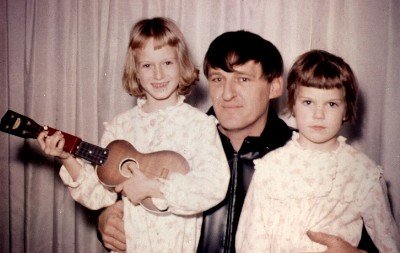 Val (with ukulele), John, & Vicky rockin' 'round the clock, Manhattan, Illinois, 1967 |
The music aspect of my life took a definite turn for the better when we moved from Manhattan (a tiny farming community near Joliet) to Lemont (a less tiny community nearer to Chicago). This move occurred during my fourth grade year in school. At my previous school there had been a band that started students in second grade, but it was very low profile and I took no notice.
The Lemont school made a big deal about introducing all students to the opportunity to join the band in fifth grade. We all took the Selmer test (still used today to determine children's aural development and understanding) and attended an assembly where we watched as the instruments were introduced and demonstrated on stage. Through this process I decided to play clarinet, mostly because all my friends were going to as well.
It was obvious that I was not a natural when it came to playing this instrument, as it took at least a week of effort before I even got a little squeak out of the thing, and my progress was erratic, but persistent, for the first few years. I loved to practice, even when I sounded horrible, and never lacked for music. We had all sorts of song books, music for violin, guitar, piano, and accordion, and plenty of sheet music. I played it all.
The band program opened up a whole new dimension to my musical experiences, and its consistent, thorough training taught me to read and perform all manner of pieces, as well as helping me acquire a number of social skills that are unique to this sort of endeavor. Only one person ran the entire grade school and high school band programs, but he was an excellent musician and teacher. For eight years, he and my private teachers provided the guidance necessary for me to get a good grounding in clarinet performance. Through the band program, I played concerts, solos and chamber music, participated in festivals, competitions and summer music camps at the University of Illinois, played in polka bands and Dixieland combos, and began teaching private lessons.
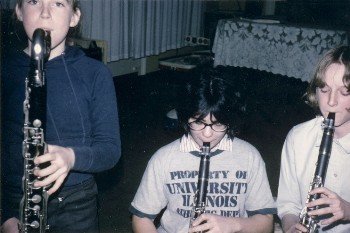 Trio: Vicky on bass clarinet with friend, Cheryl, and Val on clarinets, Lemont, Illinois, 1971 |
Although performing was the center of my grade school and high school music experiences, it was not the only thing going on. In the 1970's, Chicago was unique in having three FM radio stations that were either exclusively or mostly classical and concert format. Between WEFM, WFMT, and WNIB, I could always channel-surf, if one station happened to have news or talk, and find just music. Of course, I still liked the eclectic blend of folk, pop, and ethnic that I heard on programs like "Midnight Special," a Saturday night ritual for several years, and easy listening, that my mom preferred. The signature theme for Music Radio WLS still runs through my head when I hear the call letters (I'd also heard a story that WLS was originally owned by Sears and the letters stood for World's Largest Store). The public television station in Chicago would broadcast all sorts of performances of operas, ballets and concerts. Being in the same county as Chicago, we were entitled to a Chicago Public Library card and I could check out both scores and records of just about any piece in which I took an interest.
During my teens, I delighted in attending concerts in Chicago, shopping for music at Carl Fischer's, and looking for steeply discounted LPs at Rose Records. The Chicago Public Library building that I visited became the Cultural Center, still housing the music resources, and providing free concerts on a weekly basis. During the summers I made many train trips into Union Station to enjoy the offerings of the Loop.
It might seem only natural, after all the performing and practice that I did, that I plan on majoring in music when I went to college. In reality, I only decided on music performance (over art and biology) when I had to fill in the application forms, during my last year of high school. Once I got through the audition and application process, the years I spent studying music in college were many times more intense than anything I'd previously experienced. I loved every minute of it.